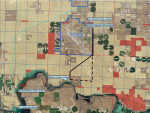Water pipeline project addressed at community meeting

As plans to build a water pipeline from the Snake River to Mountain Home Air Force Base continue to move forward, officials at the base met with members of the community last week to outline the project.
The project includes installing approximately 20 miles of underground water lines along with a pump station and water treatment plant that connects to the base.
In recent years, engineers at the base have worked with representatives from the Idaho Department of Water Resources to reduce the installation's usage of an underground aquifer that supplies water to the installation.
Ongoing usage is causing the water in the underground reservoir to decline by about two feet every year with base officials indicating it could run dry within 15 to 20 years. Reducing or eliminating the base's reliance on that declining aquifer is expected to bolster the installation's long-term viability and reduce potential conflicts between water users if officials have to curtail certain water rights.
When complete, that pipeline is expected to reduce demand on that aquifer. In addition, it's expected to possibly benefit the City of Mountain Home as well.
In early 2016, the city and base signed an agreement that involves the possibility of extending that pipeline to deliver additional river water from the base to the city and surrounding area.
After multiple studies by environmental agencies, IDWR and state and base engineers, recommendations were developed to build a pipeline to pump water up from the Snake River east of C.J. Strike Dam to the installation.
Before that could start, officials at the Air Force base had to acquire water rights to pump water from the Snake River in addition to gaining land access from the Bureau of Land Management. Officials are now on the next phase to build a water treatment plant and large scale pipe system to bring the water up from the Snake River to be converted for base usage.
During the Jan. 17 public meeting at the Mountain Home Public Library, engineers said they have identified three different routes for the water pipeline. Each route, however, runs straight through protected birds of prey nesting grounds.
Biologists and environmentalists said they are not as concerned with the route because once construction is finished, there will not be any equipment visible above the surface to disrupt the habitat. Their only concern is the time of year when construction is expected to happen.
Migratory birds begin their courting in late January, and by mid-June, the chicks have grown to fledgelings and are ready to leave the nest, according to zoologist Joseph Weldon with the Bureau of Land Management.
That time frame narrows the construction window to about four months of good weather for the pipeline and water treatment plant. For this reason, the team is looking at two years of construction for a pipeline that could stretch close to 20 miles.
The advantage to this plan is that once the equipment is in place and operational the entire base will switch over to the pipeline water, officials said. The aquifer wells will continue to be checked and maintained in the event they would ever need to be used as a back up source, otherwise the base will stop drawing from them. This will add to the life of the aquifer.
"It's good for the health of the region and other users said Lt. Col. Christopher Eyle, commander of the 366th Civil Engineer Squadron at the base. Eyle, together with Nathan Rowland with the squadron's environmental office, have been the leaders of the project bringing together government groups and project experts.
Financially, there will be no cost to the public. Priced at about $1 million per mile, it is financed through revenue bonds. The cost of those bonds will be paid off by the Air Force base through the usage cost the installation will pay over the next 20 to 25 years.
"What's good for the base is good for Mountain Home," said Mayor Rich Sykes about the pipeline and water conservation.
